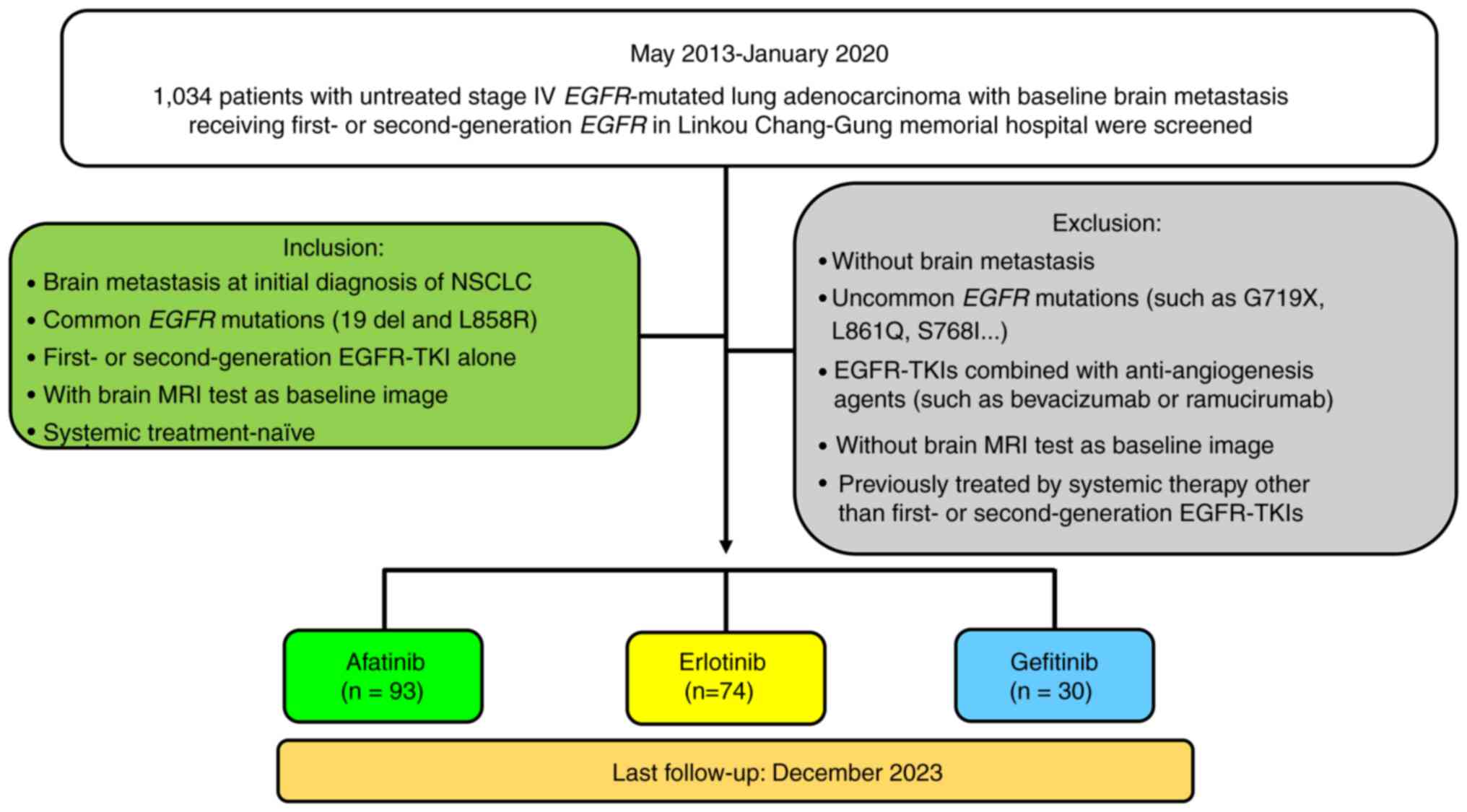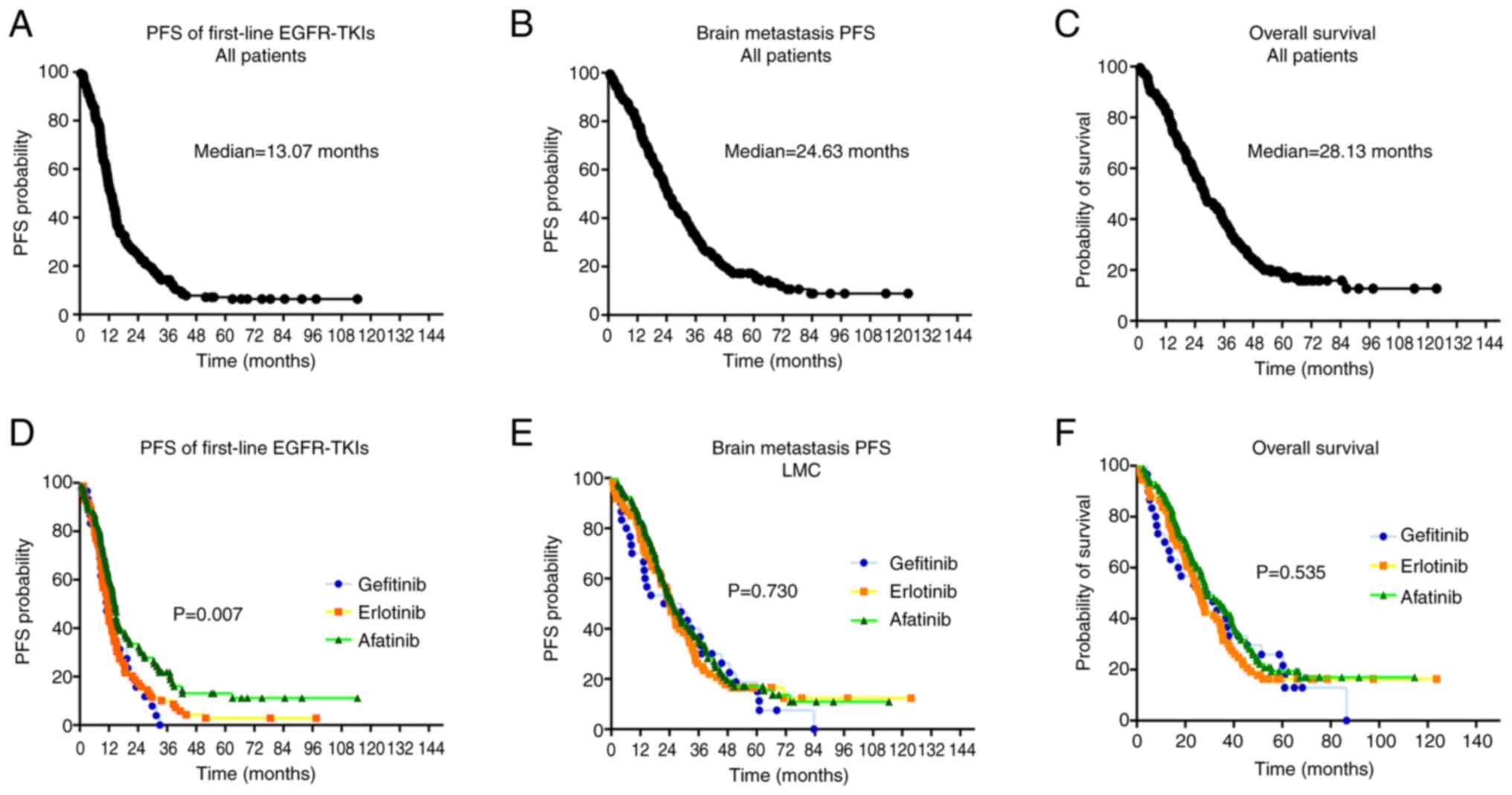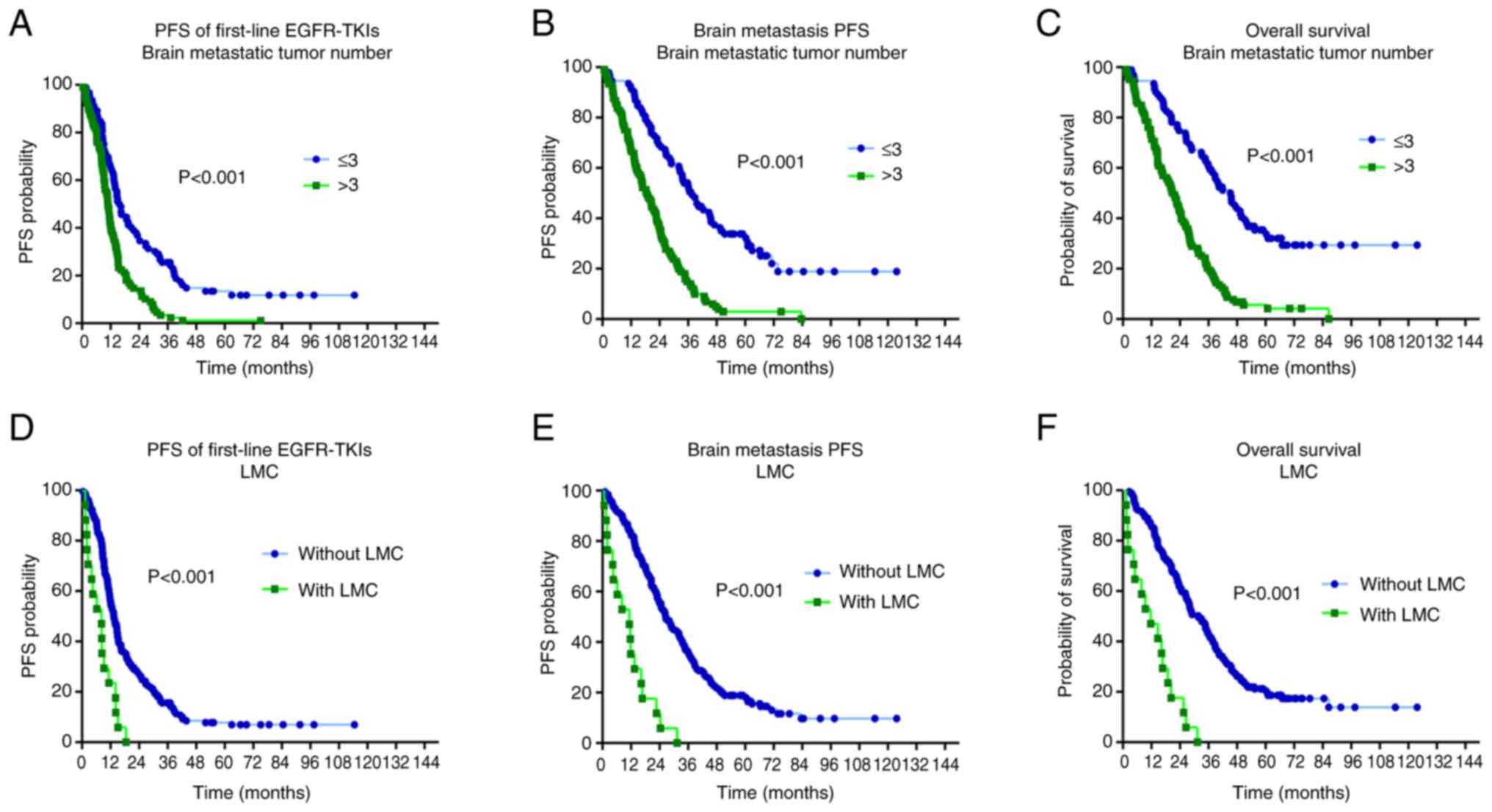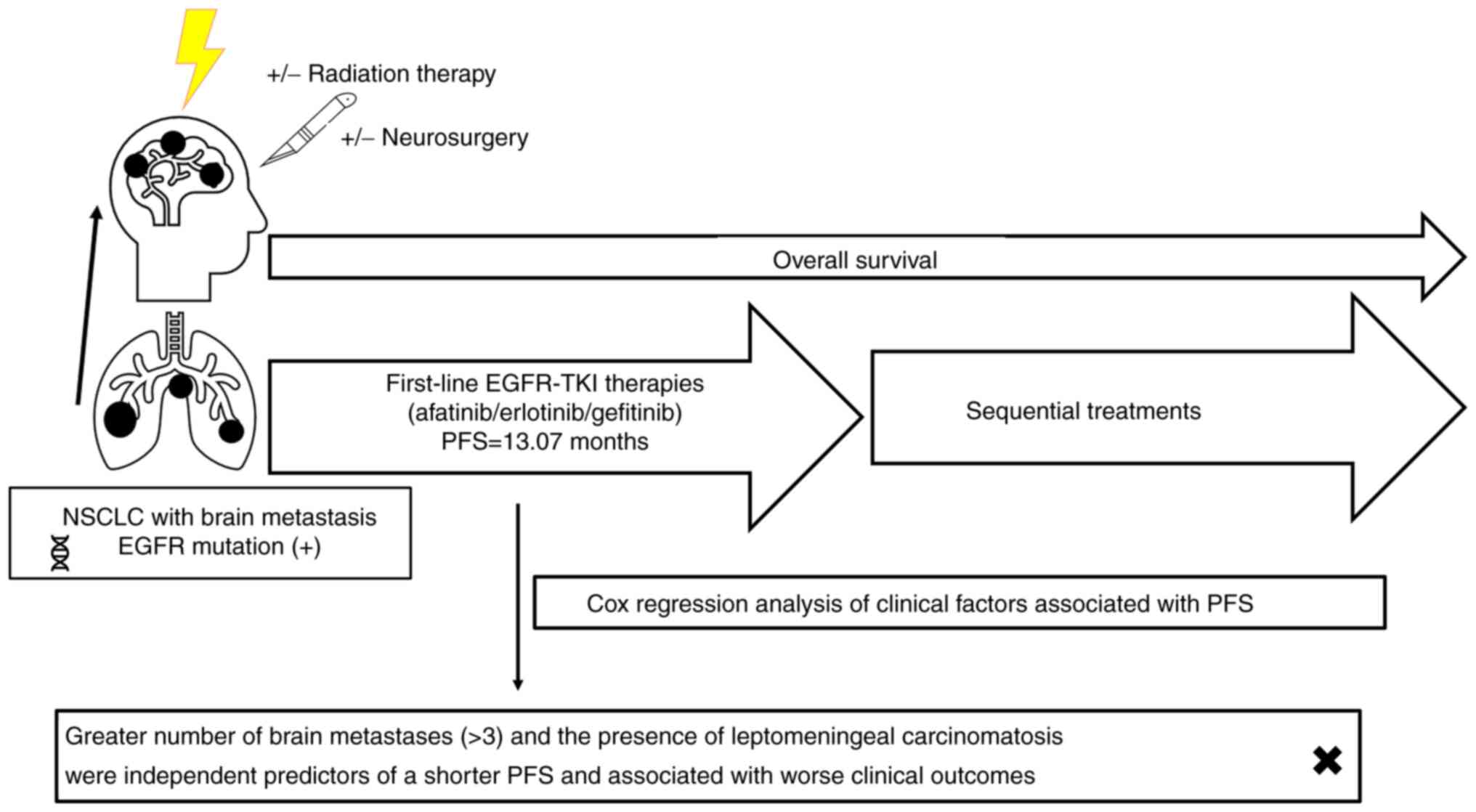|
1
|
Sharma SV, Bell DW, Settleman J and Haber
DA: Epidermal growth factor receptor mutations in lung cancer. Nat
Rev Cancer. 7:169–181. 2007. View
Article : Google Scholar : PubMed/NCBI
|
|
2
|
Liu SV, Elkins IB, Feldman J and Goldberg
SB: EGFR mutations are not all the same: The importance of
biomarker testing in non-small cell lung cancer (NSCLC)-A podcast
discussion between patients and oncologists. Oncol Ther.
11:419–431. 2023. View Article : Google Scholar : PubMed/NCBI
|
|
3
|
Li K, Yang M, Liang N and Li S:
Determining EGFR-TKI sensitivity of G719X and other uncommon EGFR
mutations in non-small cell lung cancer: Perplexity and solution
(Review). Oncol Rep. 37:1347–1358. 2017. View Article : Google Scholar : PubMed/NCBI
|
|
4
|
Hsu PC, Lee SH, Chiu LC, Lee CS, Wu CE,
Kuo SC, Ju JS, Huang AC, Li SH, Ko HW, et al: Afatinib in untreated
stage IIIB/IV lung adenocarcinoma with major uncommon epidermal
growth factor receptor (EGFR) mutations (G719X/L861Q/S768I): A
multicenter observational study in Taiwan. Target Oncol.
18:195–207. 2023. View Article : Google Scholar : PubMed/NCBI
|
|
5
|
Valley CC, Arndt-Jovin DJ, Karedla N,
Steinkamp MP, Chizhik AI, Hlavacek WS, Wilson BS, Lidke KA and
Lidke DS: Enhanced dimerization drives ligand-independent activity
of mutant epidermal growth factor receptor in lung cancer. Mol Biol
Cell. 26:4087–4099. 2015. View Article : Google Scholar : PubMed/NCBI
|
|
6
|
Hsu PC, Chang JW, Chang CF, Huang CY, Yang
CT, Kuo CS, Fang YF and Wu CE: Sequential treatment in advanced
non-small cell lung cancer harboring EGFR mutations. Ther Adv
Respir Dis. 16:175346662211327312022. View Article : Google Scholar : PubMed/NCBI
|
|
7
|
Lin CY, Chou YT, Su PL, Lin CC, Chang JW,
Huang CY, Fang YF, Chang CF, Kuo CS, Hsu PC, et al: Generation and
validation of a predictive model for estimating survival among
patients with EGFR-mutant non-small cell lung cancer. Am J Cancer
Res. 13:4208–4221. 2023.PubMed/NCBI
|
|
8
|
Morimoto K, Yamada T, Takeda T, Shiotsu S,
Date K, Tamiya N, Goto Y, Kanda H, Chihara Y, Kunimatsu Y, et al:
Clinical efficacy and safety of first- or second-generation
EGFR-TKIs after osimertinib resistance for EGFR mutated lung
cancer: A prospective exploratory study. Target Oncol. 18:657–665.
2023. View Article : Google Scholar : PubMed/NCBI
|
|
9
|
Huang AC, Huang CH, Ju JS, Chiu TH, Tung
PH, Wang CC, Liu CY, Chung FT, Fang YF, Guo YK, et al: First- or
second-generation epidermal growth factor receptor tyrosine kinase
inhibitors in a large, real-world cohort of patients with non-small
cell lung cancer. Ther Adv Med Oncol. 13:175883592110357102021.
View Article : Google Scholar : PubMed/NCBI
|
|
10
|
Marin-Acevedo JA, Pellini B, Kimbrough EO,
Hicks JK and Chiappori A: Treatment strategies for non-small cell
lung cancer with common EGFR mutations: A review of the history of
EGFR TKIs approval and emerging data. Cancers (Basel). 15:6292023.
View Article : Google Scholar : PubMed/NCBI
|
|
11
|
Hsu PC, Miao J, Huang Z, Yang YL, Xu Z,
You J, Dai Y, Yeh CC, Chan G, Liu S, et al: Inhibition of
yes-associated protein suppresses brain metastasis of human lung
adenocarcinoma in a murine model. J Cell Mol Med. 22:3073–3085.
2018. View Article : Google Scholar : PubMed/NCBI
|
|
12
|
Hsu PC, Chiu LC, Chen KT, Wang CC, Wu CT,
Wu CE, Ko HW, Kuo SC, Lin YC, Wang CC and Yang CT: Clinical outcome
analysis of non-small cell lung cancer patients with brain
metastasis receiving metastatic brain tumor resection surgery: A
multicenter observational study. Am J Cancer Res. 13:3607–3617.
2023.PubMed/NCBI
|
|
13
|
Shin DY, Na II, Kim CH, Park S, Baek H and
Yang SH: EGFR mutation and brain metastasis in pulmonary
adenocarcinomas. J Thorac Oncol. 9:195–199. 2014. View Article : Google Scholar : PubMed/NCBI
|
|
14
|
Park SJ, Kim HT, Lee DH, Kim KP, Kim SW,
Suh C and Lee JS: Efficacy of epidermal growth factor receptor
tyrosine kinase inhibitors for brain metastasis in non-small cell
lung cancer patients harboring either exon 19 or 21 mutation. Lung
Cancer. 77:556–560. 2012. View Article : Google Scholar : PubMed/NCBI
|
|
15
|
Li SH, Liu CY, Hsu PC, Fang YF, Wang CC,
Kao KC, Tseng LC and Yang CT: Response to afatinib in
treatment-naïve patients with advanced mutant epidermal growth
factor receptor lung adenocarcinoma with brain metastases. Expert
Rev Anticancer Ther. 18:81–89. 2018. View Article : Google Scholar : PubMed/NCBI
|
|
16
|
Huang SF, Liu HP, Li LH, Ku YC, Fu YN,
Tsai HY, Chen YT, Lin YF, Chang WC, Kuo HP, et al: High frequency
of epidermal growth factor receptor mutations with complex patterns
in non-small cell lung cancers related to gefitinib responsiveness
in Taiwan. Clin Cancer Res. 10:8195–8203. 2004. View Article : Google Scholar : PubMed/NCBI
|
|
17
|
National Cancer Institute Common
Terminology, . Criteria for adverse events (version 3.0).
|
|
18
|
Baik CS, Chamberlain MC and Chow LQL:
Targeted therapy for brain metastases in EGFR-mutated and
ALK-rearranged non-small-cell lung cancer. J Thorac Oncol.
10:1268–1278. 2015. View Article : Google Scholar : PubMed/NCBI
|
|
19
|
Zeng Y, Su X, Zhao Y, Zhou Y, Guo T, Chu
X, Chu L, Yang X, Ni J and Zhu Z: Rationale and value of
consolidative cranial local therapy in EGFR-mutant non-small cell
lung cancer patients with baseline brain metastasis treated with
first-line EGFR-TKIs. Ther Adv Med Oncol. 15:175883592311699752023.
View Article : Google Scholar : PubMed/NCBI
|
|
20
|
Mahajan A, Ahmed S, McAleer MF, Weinberg
JS, Li J, Brown P, Settle S, Prabhu SS, Lang FF, Levine N, et al:
Post-operative stereotactic radiosurgery versus observation for
completely resected brain metastases: A single-centre, randomised,
controlled, phase 3 trial. Lancet Oncol. 18:1040–1048. 2017.
View Article : Google Scholar : PubMed/NCBI
|
|
21
|
Tsui DCC, Camidge DR and Rusthoven CG:
Managing central nervous system spread of lung cancer: The state of
the art. J Clin Oncol. 40:642–660. 2022. View Article : Google Scholar : PubMed/NCBI
|
|
22
|
Linh DM, Thinh TH, Hieu NV and Duc NM:
Treatment outcomes of EGFR-TKI with or without locoregional brain
therapy in advanced EGFR-mutant non-small cell lung cancer patients
with brain metastases. Contemp Oncol (Pozn). 27:71–79.
2023.PubMed/NCBI
|
|
23
|
Colclough N, Chen K, Johnström P,
Strittmatter N, Yan Y, Wrigley GL, Schou M, Goodwin R, Varnäs K,
Adua SJ, et al: Preclinical comparison of the blood-brain barrier
permeability of osimertinib with other EGFR TKIs. Clin Cancer Res.
27:189–201. 2021. View Article : Google Scholar : PubMed/NCBI
|
|
24
|
Soria JC, Ohe Y, Vansteenkiste J,
Reungwetwattana T, Chewaskulyong B, Lee KH, Dechaphunkul A, Imamura
F, Nogami N, Kurata T, et al: Osimertinib in untreated EGFR-mutated
advanced non-small-cell lung cancer. N Engl J Med. 378:113–125.
2018. View Article : Google Scholar : PubMed/NCBI
|
|
25
|
Huang YH, Hsu KH, Tseng JS, Yang TY, Chen
KC, Su KY, Yu SL, Chen JJW and Chang GC: The difference in clinical
outcomes between osimertinib and afatinib for first-line treatment
in patients with advanced and recurrent EGFR-mutant non-small cell
lung cancer in Taiwan. Target Oncol. 17:295–306. 2022. View Article : Google Scholar : PubMed/NCBI
|
|
26
|
Holleman MS, Al MJ, Zaim R, Groen HJM and
Uyl-de Groot CA: Cost-effectiveness analysis of the first-line
EGFR-TKIs in patients with non-small cell lung cancer harbouring
EGFR mutations. Eur J Health Econ. 21:153–164. 2020. View Article : Google Scholar : PubMed/NCBI
|
|
27
|
Guan H, Wang C, Chen C, Han S and Zhao Z:
Cost-effectiveness of 12 first-line treatments for patients with
advanced EGFR mutated NSCLC in the United Kingdom and China. Front
Oncol. 12:8196742022. View Article : Google Scholar : PubMed/NCBI
|
|
28
|
Shah PP, Franke JL, Medikonda R, Jackson
CM, Srivastava S, Choi J, Forde PM, Brahmer JR, Ettinger DS,
Feliciano JL, et al: Mutation status and postresection survival of
patients with non-small cell lung cancer brain metastasis:
Implications of biomarker-driven therapy. J Neurosurg. 136:56–66.
2021. View Article : Google Scholar : PubMed/NCBI
|
|
29
|
Perng PS, Hsu HP, Lee PH, Huang CC, Lin CC
and Lee JS: Correlation of EGFR mutation subtypes and survival in
surgically treated brain metastasis from non-small-cell lung
cancer. Asian J Surg. 46:269–276. 2023. View Article : Google Scholar : PubMed/NCBI
|
|
30
|
Cheng H and Perez-Soler R: Leptomeningeal
metastases in non-small-cell lung cancer. Lancet Oncol. 19:e43–e55.
2018. View Article : Google Scholar : PubMed/NCBI
|
|
31
|
Hong Y, Miao Q, Zheng X, Xu Y, Huang Y,
Chen S, Huang Z, Xu H, Jiang K, Zhong Q, et al: Effects of
intrathecal pemetrexed on the survival of patients with
leptomeningeal metastasis from lung adenocarcinoma: A propensity
score matching analysis. J Neurooncol. 165:301–312. 2023.
View Article : Google Scholar : PubMed/NCBI
|
|
32
|
Feng PH, Chen KY, Huang YC, Luo CS, Wu SM,
Chen TT, Lee CN, Yeh CT, Chuang HC, Han CL, et al: Bevacizumab
reduces S100A9-positive MDSCs linked to intracranial control in
patients with EGFR-mutant lung adenocarcinoma. J Thorac Oncol.
13:958–9567. 2018. View Article : Google Scholar : PubMed/NCBI
|
|
33
|
Lee SH, Lin YC, Chiu LC, Ju JS, Tung PH,
Huang AC, Li SH, Fang YF, Chen CH, Kuo SC, et al: Comparison of
afatinib and erlotinib combined with bevacizumab in untreated stage
IIIB/IV epidermal growth factor receptor-mutated lung
adenocarcinoma patients: A multicenter clinical analysis study.
Ther Adv Med Oncol. 14:175883592211132782022. View Article : Google Scholar : PubMed/NCBI
|
|
34
|
Bar J, Peled N, Schokrpur S, Wolner M,
Rotem O, Girard N, Aboubakar Nana F, Derijcke S, Kian W, Patel S,
et al: UNcommon EGFR Mutations: International Case Series on
Efficacy of Osimertinib in Real-Life Practice in First-LiNe Setting
(UNICORN). J Thorac Oncol. 18:169–180. 2023. View Article : Google Scholar : PubMed/NCBI
|
|
35
|
Hsu PC, Chang JW, Chiu LC, Yang CT, Kuo
SC, Fang YF and Wu CE: Analysis of genomic alternations in
epidermal growth factor receptor (EGFR)-T790M-mutated non-small
cell lung cancer (NSCLC) patients with acquired resistance to
osimertinib therapy. Clin Transl Oncol. Sep 24;doi:
10.1007/s12094-024-03727-7 (Epub ahead of print).
|
|
36
|
Shalata W, Abu Jama A, Dudnik Y, Abu Saleh
O, Shalata S, Tourkey L, Sheva K, Meirovitz A and Yakobson A:
Adverse events in osimertinib treatment for EGFR-Mutated
Non-Small-Cell lung cancer: Unveiling Rare Life-threatening
myelosuppression. Medicina (Kaunas). 60:12702024. View Article : Google Scholar : PubMed/NCBI
|
|
37
|
Zhou S, Kishi N, Alerasool P and Rohs NC:
Adverse event profile of epidermal growth factor receptor tyrosine
kinase inhibitors for Non-small cell lung cancer: An updated
Meta-analysis. Target Oncol. 19:547–564. 2024. View Article : Google Scholar : PubMed/NCBI
|
|
38
|
Marrett E, Kwong WJ and Chow LQ: Factors
associated with time to EGFR TKI treatment in patients with
non-squamous metastatic non-small-cell lung cancer. Future Oncol.
18:1535–1544. 2022. View Article : Google Scholar : PubMed/NCBI
|
|
39
|
Ju JS, Huang AC, Tung PH, Huang CH, Chiu
TH, Wang CC, Ko HW, Chung FT, Hsu PC, Fang YF, et al: Brain
metastasis, EGFR mutation subtype and generation of EGFR-TKI
jointly influence the treatment outcome of patient with EGFR-mutant
NSCLC. Sci Rep. 13:203232023. View Article : Google Scholar : PubMed/NCBI
|
|
40
|
Gu Y, Xu Y, Zhuang H, Jiang W, Zhang H, Li
X, Liu Y, Ma L, Zhao D, Cheng Y, et al: Value and significance of
brain radiation therapy during first-line EGFR-TKI treatment in
lung adenocarcinoma with EGFR sensitive mutation and synchronous
brain metastasis: Appropriate timing and technique. Thorac Cancer.
12:3157–3168. 2021. View Article : Google Scholar : PubMed/NCBI
|


















